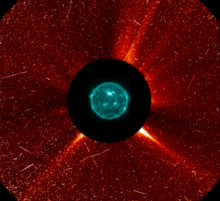news
Submitted on 2015-09-02NOAA 2403, an active region visible during the last 2 weeks of August, has been one of the largest and most complex sunspot groups so far this year. Its maximum surface area was 7 times that of the Earth, and its mixed magnetic polarities were the source of numerous small and moderate solar flares. No wonder that many astronomers took the time for a photoshoot of this marvellous sunspot group!

Submitted on 2015-08-05Solar activity has been very low over the last few weeks, with the last big solar flare already dating back to 25 June. That day, NOAA 2371 produced the last and strongest of its series of 6 M-class flares. The M7.9 flare peaked at 08:16UT and its space weather effects were extensively discussed in the 3 July 2015 Newsletter.

Submitted on 2015-07-29As discussed in a previous news item (see 4 June 2014), both STEREO spacecraft are on the other side of the Sun as seen from Earth. This is called a superior solar conjunction - see diagram underneath for the position of both spacecraft. For some time, each spacecraft is blocked by the solar disk making it impossible to communicate with it or receive data or images from it.
Submitted on 2015-07-23A very nice filament eruption occurred during the morning hours of 19 July. It was associated with a long-duration C2.1 flare that started at 09:22UT, peaked at 10:40UT, and ended at 13:02UT though it would take another 6 to 8 hours before the x-ray flux was back at its pre-event levels. The eruption of the filament itself took place between 07:00 and 10:00UT.


Submitted on 2015-07-16On 22 June 2015, the strongest proton event so far this year took place, with the greater than 10 MeV proton flux reaching 1070 pfu (proton flux units; Notes 1 and 2). It was only the 5th such event (more than 1000 pfu) so far this solar cycle (SC), and only the 41st since the start of systematic satellite measurements began in 1976. Interestingly, the maximum (19:00UT) coincided with a period of severe geomagnetic storming (Kp=8) from 18:00-21:00UT, and with a a moderate M6.5 flare peaking at 18:23UT. This was nicely illustrated by the overview chart from SWPC (image underneath).
Submitted on 2015-07-08On 1 July 2015, the revised sunspot number (SN) was introduced by the World Data Center SILSO (see this press item). This "Version 2.0" obviously affects the maximum and minimum values of each solar cycle (SC), as well as some of the related timings, i.e. the time it takes for solar activity to rise from minimum to maximum (Trise), and back to the next minimum (Tfall).

Submitted on 2015-06-24Proton events have already been discussed in earlier news items, such as on 23 January 2014 and on 16 August 2012. It concerns solar eruptions associated with a strong increase in the flux of particles with energies of 10 MeV or more (Note 1). Once this proton flux exceeds the pre-established threshold of 10 pfu (Note 2), it is considered a proton event, if not it is labeled a proton flux enhancement.
Submitted on 2015-06-09
| A very nice filament eruption occurred near the north-western solar limb during the morning hours of 3 June 2015. It concerned the long filament already mentioned in the previous news item of 27 May 2015, when it was still in the north-eastern quadrant. |
 |
|
Submitted on 2015-05-27Last week, the sunspot activity was again all but exciting. Only a few, very small, and mostly inactive sunspot groups were visible in white light. In H-alpha, which is a filter showing the "cold" inner atmosphere of the Sun, the Sun's outlook was dominated by some long filaments. These are local belts of plasma squeezed together by opposite polarity magnetic fields (see last week's newsletter). Moving up to the hot outer solar atmosphere, the extreme ultraviolet (EUV) imagery from SDO showed darkish patches.
Pages
Zircon - This is a contributing Drupal Theme
Design by
WeebPal.





















